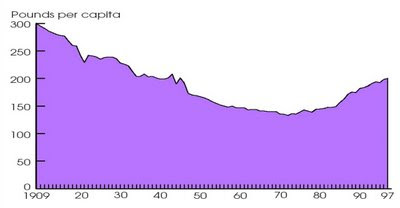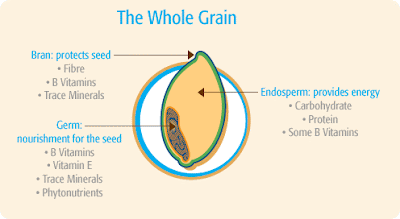First, a little perspective.
Carbohydrates are not evil. They have been the backbone of humankind since the dawn of civilization. The large scale cultivation of carbohydrates (e.g. cereal grains) provided the vast amounts of energy (calories) that fueled the growth and eventual urbanization of humans. They have also been important sources of protein, fiber, vitamins, minerals and essential fatty acids.
Throughout our evolution, humans (like all herbivors) have needed sugar and other carbohydrates to survive. Funnily enough, we still do. Of course, the dominance of cereal grains as the provider of carbohydrates is a relatively new phenomenon (10-15 thousand years). And the advent and supremely high intake of refined carbohydrates is extremely recent (within the last 50 to 100 years).
With all the media attention carbs have gotten recently, you would think our grain intake had reached historics highs. Actually, we eating less grains then we did 100 years ago.
Per Capita Grain Consumption.
Source: Putnam & Allshouse. U.S. Per Capita Food Supply Trends. Food Review. Sept. 1998
Source: Putnam & Allshouse. U.S. Per Capita Food Supply Trends. Food Review. Sept. 1998
So why all the bad press? The reason is that our intake of refined grains has indeed skyrocketed: see the recent upslope in the graph above (a 50% increase in grain intake since 1973), the vast majority of that increase is from refined grains.
And study after study continues to point a damming finger at people who eat the most refined grains - revealing they have higher rates of obesity, heart disease, diabetes and so on.
What is refined or processed?
Most grains come from grasses. Each stalk of grass yields numerous berries or seeds -these are the nutrient and energy dense bundles that can generate entire new grasses. Fortunately for us, they are also edible.
To a certain degree all grains require some "processing" - harvesting, removing the outer husks from the grainseed and then sprouting or cooking. Yes, some grains like corn can be eaten raw. But most become more digestible and valuable when soaked, sprouted or cooked.
However, when we talk about "refining" we're talking about processing the grain even further by removing the outer layers (the bran + germ) from the grainseeds.
Layers of a whole grain.
Image Source: http://www.nutricoach.net/Carbohydrates.html
Image Source: http://www.nutricoach.net/Carbohydrates.html
Grains, either in whole or refined form, can also be crushed or milled into flour or ground into meal. However, refined grain flour has been stripped of so many nutrients that they sometimes add back a small handful of the vitamins and minerals lost to the end product, called enriched flour. (Depending on the grain, processing it into a flour or meal also further strips it of some protein, fiber and nutrients.)
What is wrong with refining and processing grains?
Well, as mentioned, it turns out that most of the valuable nutrients, fats, and fiber are in the outer parts of the grain. Refining leaves us mostly with starch (long chains of sugar), a bit of protein and a few nutrients - we call this package a refined carbohydrate. So if you eat only refined and processed grains then you're missing out on most of the beneficial properties of the whole grain.
In the absence of fiber, these refined "carbohydrates" are rapidly absorbed from your digestive system - giving you a blood sugar spike. Eating refined grains raises your risk for diabetes; eating more whole grains lowers it.
Because fiber is (by definition) not absorbed, fiber-free grain (i.e. refined grains) is also more energy-dense. You'll eat more calories of a bowl of white rice then you will brown rice. Eating more refined grain will make you heavier; eating more whole grain will help you stay leaner.
A brief tangent. What's the difference between simple sugar and refined carbohydrate?
Sugar can be called simple or complex depending on how it's packaged. One or two sugar molecules by themselves = simple sugar (e.g. table sugar). Many sugar molecules chained together = complex sugar (e.g. starch inside grains or potatoes). For reasons you might guess, it's not too useful to talk about simple vs. omplex sugars because complex sugars by themselves are easily broken down into simple sugars. What matters is the whether the sugar is packed in fiber and nutrients - i.e. is it refined or unrefined?
Finally, refining grains into sugar makes them more addictive. This may be true of both simple (e.g. high fructose corn syrup) and to a slightly lesser degree complex sugars (e.g white wheat flour) refined from grains. This is a controversial point, but the emerging evidence is pointing in this direction. Sugar acts on the brain in a manner similar to many drugs. And refining makes all drugs more addictive, for at least two basic reasons. First, the active ingredient is vastly more concentrated and second it gets to the brain quicker, setting up a stronger cycle of high-withdrawal-high. Think: cocaine vs whole coca leaf tea; intravenous morphine vs. opium poppy milk.
Of course, we can take this comparison too far, but it is certainly possible that the addictive properties of sugar explain why so many of us have a hard time 'moderating' our intake of refined grains.
But you said sugar wasn't evil.
It's not. We all need sugar. But too much is bad. And slow-release sugar (i.e. sugar coupled with fiber and healthy fat) is arguably much better for us.
Refined grains are everywhere.
Cereal. Pasta. Bagels. Muffins. Rice. Crackers. Candies. Soda. Cakes. Pastries. Bread. The majority of these foods are made with refined grains today. Take a close look around and you will see how dominant refined grains are in the food supply.
Most of us are eating several of these foods everyday. They fill us up, preventing us from eating more nutrient dense foods. And as everyone knows, it's very easy to eat too many of them.
How to spot refined grains:
Refined grains are now the norm, so you will never see the word "refined" or "processed" in the ingredient list. Instead you need to recognize all the terms that code for refined:
-flour (or enriched flour)
-rice (or rice syrup)
-corn syrup (or high-fructose corn syrup, aka HFCS)
-corn or rice starch
-wheat
....And so on.
Another route is to realize that if the grain is still in its whole form then it will be labeled as such: the words "whole" or "unrefined" will be put in front of the grain name. e.g. whole wheat.
There are a few exceptions to know about: corn and oats are always "whole" grain. But they can be processed to one degree or another. Oat groats are much less processed than the steamed and squashed "instant oats", and therefore better for you. Whole grain rice will usually be called "brown rice" or "whole grain brown rice".
How to eat more whole grains:
1/ Start with your staples: start by looking at the foods you eat almost everyday. For example, many people eat a grain based breakfast (e.g. cereal, toast, muffins). Making sure these breakfast staples are 100% whole grain is a great start.
Likewise, many people eat rice or pasta almost every day. Switch to brown rice (I suggest investing in a rice maker). Experiment with the large variety of whole grain pastas (brown rice, quinoa, spelt, whole wheat) - some taste better than others, so keep on trying different ones until you know which you like best.
2/ Give yourself a few weeks to acquire the taste and habit. For example, some people love brown rice the instant they eat it, but for others it takes 3-4 weeks (or more) of frequent attempts before it starts tasting good. But in time, most people come to prefer brown to white rice.
3/ Create demand. We are creatures of habit and convenience. Ask for whole grains at restaurants and stores and soon enough you will start seeing them everywhere. We're already seeing this happen...
How to eat less refined and processed grains:
The first step is to switch your staple foods to whole grain varieties, as above.
Beyond that you will probably need to cut back on foods you probably shouldn't be eating on a daily basis - cookies, pastries, cakes, muffins, crackers, pancakes, waffles, crepes. These are treats, not everyday foods.
Yes, you can and should look for whole grain varieties of these foods. But chances are you will find varieties that might have some (but not all) whole grains in them. For instance, let's talk about cake:
Cake, even if made with whole wheat flour, is going to have a good amount of sugar (essentially the equivalent of maximally refined and processed grains) - otherwise it's just not a cake! Sugar comes in many forms - honey, agave, concentrated fruit juice or jam, brown rice syrup, brown sugar, molasses, cane sugar, beet sugar, high fructose corn syrup, maple syrup. Yes, some of these are slightly "better" forms of sugar than others, but they are still sugar - a touch is good, a lot is not.
In summary, whole wheat vegan double chocolate cake is a fantastic creation when made well. It should be thoroughly enjoyed, but not everyday.



